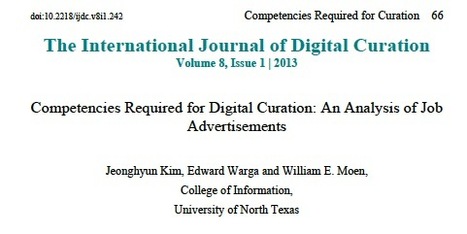
|
Scooped by Robin Good |
I am under the impression that content curation is being hijacked by those who are interested in making you think that, if you adopt curation most apparent traits (picking and reposting valuable content from others) you may be in for lots of benefits and a significant time-saving bonus.
Rohit Barghava is the person who gave, back in 2009, one of the earliest and most appropriate descriptions for "content curation" and who also identified five key basic approaches to curating content.
To this day, those articles remain milestone references for anyone interested in content curation.
This week, in a post published on his blog, Rohit reminds his readers that there's an easy cure for those who can't write or create great content: curation.
He writes: "Here is the best part about content curation, though. It doesn’t require you to be a writer, or a filmmaker, or an on-screen commentator. Curation is inherently behind the scenes.
What it does require, though, is expertise. It requires the ability to think and collect. They are different skills sets than creation, but in a business environment..."
In my experience the art of content curation, unless we refer to the ability to spot apparently interesting stuff and to pass it on to others by sharing it online, is a much more difficult and unfamiliar endevour and it requires many more skills than those required to write a simple blog post on a topic.
Why?
To curate content, you first need, as Rohit rightly points out, to be able to find good, relevant stuff, without having the ability to write it yourself. True. But finding and being able to "recognize" good stuff is not an innate or intuitive skill unless you have trained yourself to do it.
Very few of those who want to do content curation for "content marketing" purposes, take the time to vet, read, verify and evaluate stuff before publishing it. This approach would negate the advantage they think they have gained: saving time and producing more content with little time and effort.
The same is true for collecting and organizing. Saving and archiving stuff may be relatively easy, but labeling, categorizing and tagging in ways that make your collection valuable and intelligible for many others and for a long time to come is not.
Morale of the story:
a) Supermarket caviar costs a few bucks, but it has nothing to do, beyond appearance to the real deal. Try the real caviar and you'll know the difference.
b) Who reaches the top of a mountain after a comfortable helicopter ride, does not have the same view of the guy standing next to him, who arrived there by climbin gup 4000 feet on his own feet. Though the view is the same, they see a very different panorama.
c) Finding and collecting things without proper vetting, categorization, contextualization and explanation, has, little or nothing to do with content curation. It has to do with content marketing which has, as its key goal, the "...acquistion of customers".
Wikipedia says: "Content marketing is any marketing format that involves the creation and sharing of media and publishing content in order to acquire customers."
Content Marketing Institute says: "Content marketing is a marketing technique of creating and distributing relevant and valuable content to attract, acquire, and engage a clearly defined and understood target audience – with the objective of driving profitable customer action."
One thing is to learn the skills of research, investigation and presentation and then get good at finding and collecting things that my customers are deeply interested in, for the purpose of saving them time while giving them valuable insight on a specific topic.
Another thing is spotting apparently relevant content found online and republishing it without taking any of the time-consuming steps that a true content curator would. An increasingly common practice, fueled by many of the content curation vendors content marketing strategies.
For those interested in quick results in terms of traffic, visibility and exposure, this does appear as a godsend.
But the end result, over time, is more noise, as reposting content with little analysis and no added insight generates lots of more shallow and often unreliable content pointers with little or no additional value.
Serious researching, analyzing, vetting and contextualizing is not easily replaced by retweeting or reposting interesting things one can find online.
While in some instances, "aggregation" can bring indeed some rapid and relevant results by simply collecting and publishing news on a specific topic, all the other forms of curation identified by the author require some dedicated analysis, research and writing abilties to fully express their potential.
In essence, I think that the idea that "if you can't write or do proper research you can always curate", is a pretentious and misleading proposition, which, over time, may ironically work against those adopting it.
Appropriate for content marketers, not for true curators 5/10
Original post: http://www.rohitbhargava.com/2013/07/content-curation-how-to-content-marketing-creator.html
(Image credit: Girl thinking by Shutterstock)



 Your new post is loading...
Your new post is loading...












A helpful post with details by curator Robin Good that makes the points about Curation. That I'm sharing this on social media via ScoopIt makes another point, especially for readers here who share interest in social media curation. ~ Deb